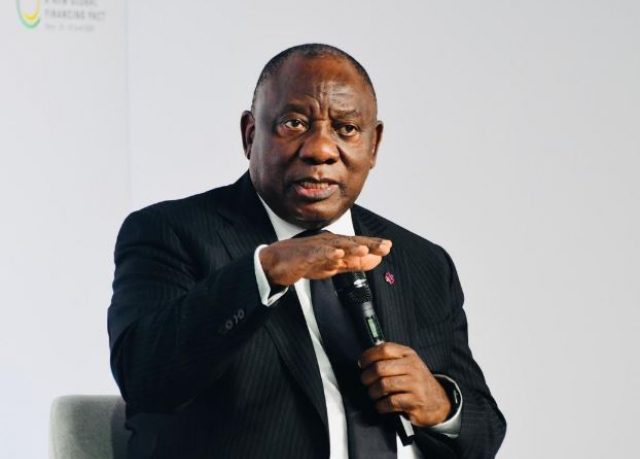- South Africa’s President, Cyril Ramaphosa, has told a high-level roundtable delegation in Paris, France, that the Just Energy Transition Partnership must be led and owned by their respective nations.
The President was speaking on several lessons learnt as South Africa undertakes the transition with a unique set of challenges that include high levels of poverty and an energy deficit. He was participating in the round table discussion on Green Growth Partnerships at the Summit for a New Global Financing Pact in Paris on Thursday.
“Firstly, it is important that Just Energy Transition Partnerships are country-led and -owned. “We have high levels of unemployment among unskilled workers, which makes potential job losses in the coal value chain more challenging. We have a constrained fiscal environment that limits the ability of government to provide social security in the event job losses,” he said.
He said the Summit was taking place at an important moment in the international climate discussions. The Summit, the President said, was a valuable platform for engagement that needs to complement – but should not supersede – the discussions in the appropriate multilateral forums, particularly the UN Framework Convention on Climate Change.
President Ramaphosa said more emphasis must be placed on the just component of the transition, in both the structuring of the investment plan and the corresponding financing package. “Countries going through a Just Energy Transition need to be clear about how they define ‘just’, particularly with respect to social impact. Given South Africa’s current energy crises, we have come to realise that flexibility is key. “Countries must be able to decide on a transition pathway that takes into consideration development objectives such as energy security,” he said.
The President said Just Energy Transition Partnerships must translate into tangible financial support.The scale of financial support needs to consider the level of development of the countries and the magnitude of the required transition.
For example, he said, the current commitment of $8.5 billion from SA’s partners is less than a tenth of what will be needed in the next five years for a meaningful and just transition. “Grants need to form a substantial portion of financial support, and any debt-related terms should be more attractive than what the country could secure in capital markets. “It is important that the financing reflects the obligation of developed economies to finance mitigation and adaptation measures in developing economies. The financing must be predictable and certain,” he said.
Through the transfer of technology and skills, the President said the transition process needs to support green industrialisation. “A Just Energy Transition requires long-term partners that will support developing economies as they move towards sustainable and green economic growth and development,” he said.
In November 2021, South Africa announced a historic Just Energy Transition Partnership with the governments of France, Germany, the United Kingdom and the United States, as well as the European Union. This partnership was established to support South Africa’s just transition to a low carbon economy and a climate resilient society. The partners agreed to an initial commitment of $8.5 billion towards this goal.
South Africa has since produced a Just Energy Transition Investment Plan that sets out the scale of financing need at approximately $98 billion. This investment plan would support investments in electricity infrastructure, support for communities and workers in coal mining areas, new energy vehicles, green hydrogen and skills development.
Author: Bryan Groenendaal
Source: SAnews.gov.za















